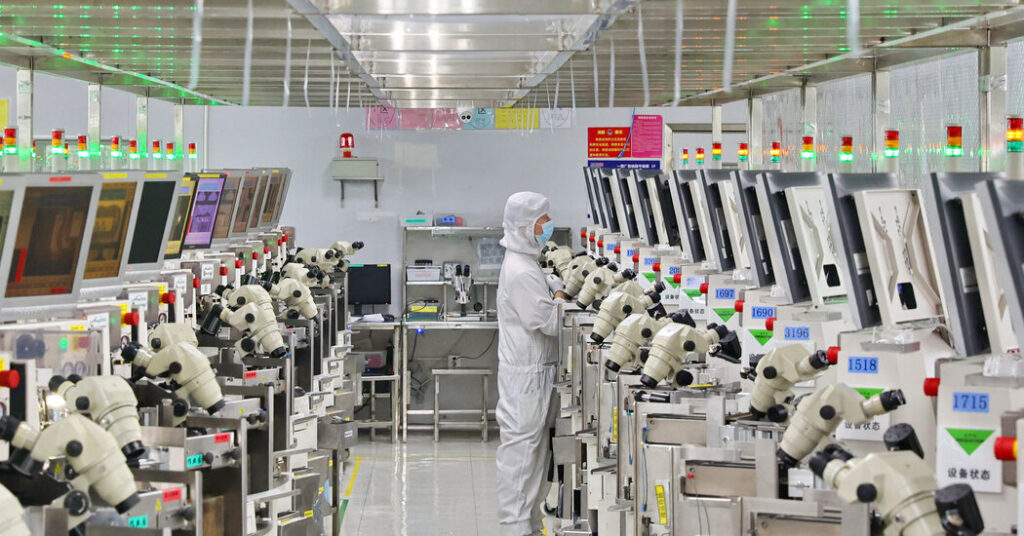Days before President-elect Donald J. Trump takes office, China is gearing up for economic battle with the United States.
It threatened a widespread investigation into American chipmakers. It zeroed in on one American retailer, accusing it of “inappropriate conduct” that could lead to sanctions usually reserved for weapons sellers. And it got ready to slap duties on imports of industrial plastics.
The flurry of retaliatory measures, all delivered this week, could have far-reaching implications for American companies. They join other measures by China in recent weeks with one objective: putting the incoming Trump administration on notice.
“It’s a warning shot to the new administration that we won’t sit back, and we have leverage also in the event of a deepening of the trade tech wars,” said Myron Brilliant, a senior counselor at Dentons Global Advisors-ASG, a business consulting firm.
So far in the tit-for-tat between the world’s superpowers, Washington has set the tone for tough measures aimed at curbing China’s economic influence and stifling the development of industries that could give it a military edge.
In its final days, the Biden administration has issued new rules to restrict Chinese access to semiconductors and imposed penalties on companies in mining, real estate, solar energy and shipping. Some observers termed it “China sanctions week.”
In the past, Beijing’s responses were measured. But its words and actions are growing sharper, and the targets of its retaliatory blows are widening to include supply chain vulnerabilities, critical minerals and individual companies.
China this week called Washington’s actions “irrational and extremely irresponsible,” adding that “no bullying or coercion can shake China’s determination to be self-reliant.” It vowed to “defend its own sovereignty, security, and development interests.”
Then regulators in Beijing took action. The Ministry of Commerce said it would investigate whether the United States was dumping low-end chips on China — a move aimed at companies like Nvidia, Intel and Micron that are already facing scrutiny.
Nvidia is under investigation by China’s antimonopoly regulator over possible violations of its antitrust law. A think tank with ties to China’s internet regulator recently called for a review of Intel. After Micron underwent a review by the same internet regulator, it was cut off from supplying chips to much of China’s market.
China said the antidumping inquiry was in response to complaints from domestic companies that American chipmakers got unfair advantages because of subsidies and grants through the 2022 CHIPS and Science Act, the U.S. industrial policy aimed at boosting chip making at home.
The policy had “caused profound and significant impact on the global semiconductor supply chain,” the China Semiconductor Industry Association said, adding that it hoped the investigations would “create a healthy and orderly market environment for industrial development.”
The same industry group previously called for a boycott of American chips as “no longer safe and reliable.”
The complaints resemble those from Washington about China’s policy of shoveling money into homegrown companies in defiance of global trade agreements.
Likewise, Beijing’s punitive actions increasingly mirror Washington’s.
Chinese officials on Thursday said that a preliminary investigation into PVH, the American retailer that owns Calvin Klein and Tommy Hilfiger, found that the company had “engaged in improper Xinjiang-related behavior.”
The scrutiny came in response to the Uyghur Forced Labor Prevention Act enacted by the U.S. Congress in 2021 banning most imports of products from Xinjiang, a region in China’s far west where the government has detained large numbers of predominantly Muslim minorities. This week, the Biden administration said it would block imports for over three dozen Chinese companies under the law.
China has quietly passed its own laws that ban compliance with laws, sanctions or boycotts in other countries. The commerce ministry has the authority to deem commercial decisions as a threat to China’s national security. In complying with U.S. law, PVH could be in breach of China’s rules.
China’s probe could lead to PVH being placed on an “unreliable entity list,” a move that would give Beijing the ability to stop its imports and exports from China, ban future investments and bar employees from the country. So far, China has placed U.S. defense companies on this list for selling weapons to Taiwan, a region over which Beijing claims sovereignty.
In an emailed response, a PVH spokeswoman said that the company complied with “all relevant laws and regulations in all countries and regions in which we operate” and was “in communication with the Chinese Ministry of Commerce and will respond in accordance with the relevant regulations.”
China also said this week that starting on Jan. 24 it would impose duties on industrial plastics. The news followed a monthslong antidumping investigation into polyformaldehyde copolymer, a chemical product exported by companies in the United States, the European Union and Japan.
China began the probe last year, days after Washington added tariffs on Chinese electric vehicles and the European Union started investigating steel exports from China.
Some observers speculate that the investigations and threats now in place on both sides could give President-elect Trump, who will be inaugurated Monday, an opening to start making deals. Some Chinese officials are hoping Mr. Trump will be incentivized to do so.
In a display of its willingness to engage with Mr. Trump, China said on Friday that Vice President Han Zheng would attend Mr. Trump’s inauguration as a representative of Xi Jinping, China’s top leader. It would be the first time a senior Chinese leader has attended such a ceremony.
“There is an implicit carrot and stick approach with China’s strategy toward Trump,” said Joe Mazur, an analyst at Trivium, the research firm.
“On the one hand they will try to play to Trump’s proclivities as a deal maker but at the same they are signaling they are willing to take some punitive actions.”
Zixu Wang contributed reporting from Hong Kong.
